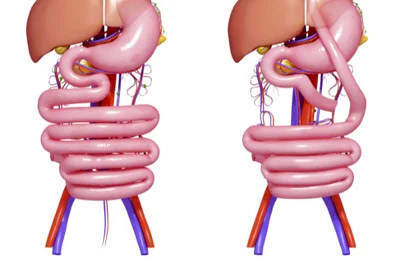Obesity is a global health problem. WHO estimates that at least 1.9 billion adults are overweight, and obesity rates continue to rise globally. Obesity predisposes you to many chronic diseases such as type 2 diabetes, cardiovascular disease, cancer, sleep apnea, and osteoarthritis.
Weight-loss surgery is an excellent option for obesity and weight loss. However, there are several reasons why you might not qualify for the procedure. This blog post explains some common reasons and what they mean to your chances of getting approval.
Types of Weight Loss Surgery
Before getting bariatric surgery, it’s crucial to understand the different types of procedures available. Below are the various bariatric operations performed by surgeons in the U.S:
Gastric Bypass
 Gastric bypass is also known as Roux-en-Y gastric bypass, gastric bypass, and is the most practiced in the U.S. It is performed in three steps, all of which require an overnight hospital stay. The first step is to create a small pouch at the top of your stomach using part of the intestine.
Gastric bypass is also known as Roux-en-Y gastric bypass, gastric bypass, and is the most practiced in the U.S. It is performed in three steps, all of which require an overnight hospital stay. The first step is to create a small pouch at the top of your stomach using part of the intestine.
Next, surgeons connect the small stomach section to a portion of the small intestines via staples or stitches. Once this procedure is completed, any food and drink you consume will go through both parts before being absorbed into your body, minimizing potential side effects like malnutrition.
Gastric Sleeve
Also known as vertical sleeve gastrectomy, gastric sleeve surgery involves removing about 80% of your stomach and creating a smaller tube-like pouch. The small pouch will be where food goes to be digested, while any excess gas or fluid will exit through a very narrow opening at the top of your stomach. With gastric sleeve surgery, some parts of your stomach are entirely removed and not replaced. As a result, you can only intake about one-fourth of your regular food intake.
Adjustable Gastric Banding
This type of surgery involves placing an inflatable band around the upper part of your stomach. The band is made of silicone and placed around the upper part of your stomach. Using a small needle, the surgeon then inserts tubing through your skin into the band and fills it with saline solution.
The inner side of the tubing can be increased or decreased using a special needle to increase the amount of saline solution in your stomach. Changing the amount of saline solution makes the band tighter and smaller if you eat more than usual, making the absorption of food difficult.
Biliopancreatic Diversion with Duodenal Switch (BPD/DS)
This procedure combines elements from both gastric bypass surgery and sleeve gastrectomy. First, surgeons remove most of your stomach using staples or stitches. Next, they create two parts out of your small intestine: a small pouch for the digestion of food and nutrients and another section that sends nutrients straight through the digestive tract to the large intestine, bypassing the stomach completely.
BPD/DS operation is one of the most complicated for surgeons and takes longer to recover from than other procedures. Still, it’s; you an effective option for patients who want to lose significant amounts of weight.
Reasons Why You Might be Denied Weight Loss Surgery
Bariatric surgery is a transformative procedure for people struggling with obesity, but not everyone can get it. To qualify as an eligible candidate, you’ll need to meet specific criteria that your surgeon sets out in the pre-surgery assessment, including:
BMI
BMI is a massive factor for your eligibility to get weight loss surgery. Surgeons have set the BMI limit for surgery at <35 kg/m2 with co-morbid conditions or <40 kg/m2 without co-morbid conditions.
An excellent way to see how you might fare if you got surgery is using this BMI calculator. As a general rule, those with a BMI under 35 will be denied surgery unless they have additional complications that affect their health, such as diabetes or heart disease.
Age
Although weight loss surgery is helpful for extreme obesity, it is not appropriate for just anyone who wants to lose weight. Most patients are in their 40s when they decide to get bariatric surgery. However, some younger individuals qualify under certain circumstances, such as suffering from severe joint pain or sleep apnea.
There has also been evidence that the effects of bariatric surgery on younger people tend to last longer than on older ones, possibly due to the continued rejuvenation of cells. People over 70 years of age have limited options when it comes to bariatric surgery.
Surgery History
Surgeons tend to be more reluctant to perform surgery on patients who have undergone bariatric procedures in the past and failed. Having multiple procedures in close succession can increase surgical risks for patients, so surgeons want to give recipients more time to see how they respond to the initial treatment before having another procedure performed on them.
If you’ve had other forms of surgery in the past but have not seen lasting results, you need to wait at least a year before considering weight loss surgery.
Health Risks
 Surgery comes with certain risks, and if you have any currently being treated conditions, you might be denied weight loss surgery. Health complications associated with their obesity, such as type 2 diabetes, sleep apnea, and high blood pressure, are also considered when making this decision.
Surgery comes with certain risks, and if you have any currently being treated conditions, you might be denied weight loss surgery. Health complications associated with their obesity, such as type 2 diabetes, sleep apnea, and high blood pressure, are also considered when making this decision.
Even if you do not have any specific complications, you’ll still need a clean bill of health before surgery. Overweight people who smoke or use other drugs are more likely to be denied weight loss surgery.
Insurance Coverage
Before undertaking a weight loss surgery, it’s vital to check if your insurance policy covers such a procedure. Not all insurance companies cover bariatric surgery, and you might even be required to make a copay each time you visit the hospital for pre-surgery appointments. In addition, if you are approved for surgery, your insurance may require that you meet certain conditions before they cover it 100%.
In Summary;
The reasons for denial vary depending on your age and medical history. To be approved for weight-loss surgery, your BMI should be at least 40 or 35 if you have a related disease like diabetes, heart disease, sleep apnea, or high blood pressure. Remember, for a successful bariatric surgery, you must follow all instructions given by your doctors before, during, and after the procedure has been done.
Feel free to contact us about weight loss surgery!
